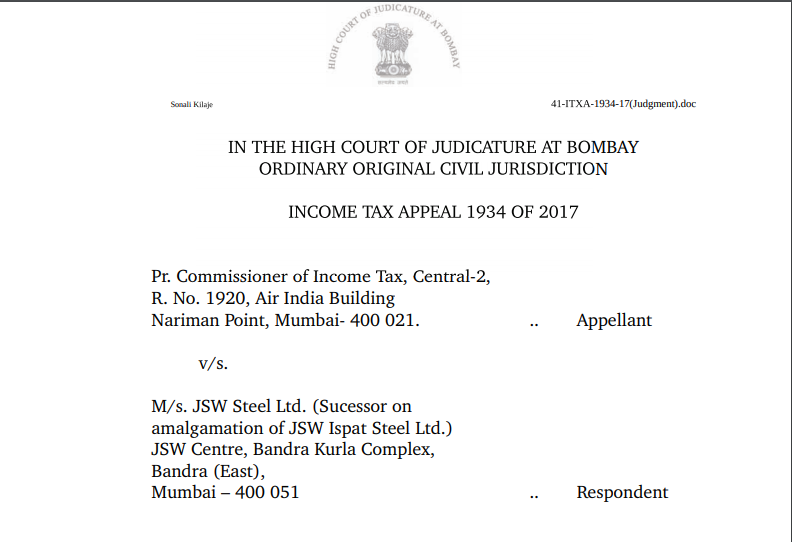Bombay HC in the case of Pr. Commissioner of Income Tax Versus M/s. JSW Steel Ltd.
Table of Contents
Case Covered:
Pr. Commissioner of Income Tax
Versus
M/s. JSW Steel Ltd.
Facts of the case:
The present appeal under Section 260A of the Income Tax Act, 1961 takes exception to the order dated 28.09.2016 passed by the Income Tax Appellate Tribunal, ‘J’ Bench, Mumbai (hereinafter referred to as “ITAT/Tribunal”), inter-alia, allowing the assessee’s appeal i.e. ITA No.33/Mum/2015. The order has arisen out of the orders of CIT (Appeals)-39, Mumbai, in Appeal Nos. CIT-39/IT-14-15 and 16/2013- 14 both of even date 02.10.2014. Assessments were finalized by DCIT, Central Circle 18 & 19, Mumbai for Assessment Years 2008-09, 2009-10 and 2010-11 under the provisions of Section 153A read with Section 143(3) of the Income Tax Act, 1961(hereinafter referred to as “the said Act”) by order dated 25.03.2013. The impugned order is for the Assessment Year 2008-09.
The assessee is a widely held public limited company engaged in various activities including the production of sponge iron, galvanized sheets, and cold-rolled coils through its steel plants located at Dolve and Kalmeshwar in Maharashtra. The assessee filed original return of income on 30.09.2008 for Assessment Year 2008-09 declaring loss at Rs.104,17,70,752/- under the provisions of Section 139(1) of the said Act. The assessee’s case was selected for scrutiny under Section 143(2) of the said Act on 03.09.2009.
Observations of the Court:
In the present case, the search was conducted on the assessee on 30.11.2010. At that point in time assessment in the case of the assessee for the assessment year, 2008-09 was pending scrutiny since notice under Section 143(2) of the Act was issued and assessment was not completed. Therefore, in view of the second proviso to Section 153A of the said Act, once assessment got abated, it meant that it was open for both the parties, i.e. the assessee as well as revenue to make claims for allowance or to make disallowance, as the case may be, etc. That apart, the assessee could lodge a new claim for the deduction, etc. which remained to be claimed in his earlier/ regular return of income. This is so because the assessment was never made in the case of the assessee in such a situation. It is fortified that once the assessment gets abated, the original return which had been filed loses its originality and the subsequent return filed under Section 153A of the said Act (which is in consequence to the search action under Section 132) takes the place of the original return. In such a case, the return of income filed under Section 153A(1) of the said Act, would be construed to be one filed under Section 139(1) of the Act and the provisions of the said Act shall apply to the same accordingly. If that be the position, all legitimate claims would be open to the assessee to raise in the return of income filed under Section 153A(1).
Judgement of the court:
From the above, we conclude that in view of the second proviso to Section 153A(1) of the said Act, once assessment gets abated, it is open for the assessee to lodge a new claim in a proceeding under Section 153A(1) which was not claimed in his regular return of income because the assessment was never made/finalized in the case of the assessee in such a situation.
We are therefore of the considered opinion that the present appeal filed by the Revenue does not give rise to any substantial question of law. Thus, the appeal filed by the Revenue is found to be devoid of merit and the same is liable to be dismissed.
The appeal filed by the Revenue is accordingly dismissed with no order as to costs.
Read the full Decision:
 ConsultEase Administrator
ConsultEase Administrator
Consultant
Faridabad, India
As a Consultease Administrator, I'm responsible for the smooth administration of our portal. Reach out to me in case you need help.








